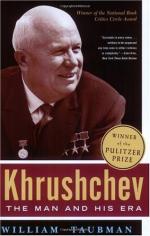
|
| Name: _________________________ | Period: ___________________ |
This test consists of 15 multiple choice questions and 5 short answer questions.
Multiple Choice Questions
1. When is Khrushchev's draft program established?
(a) 1960.
(b) 1962.
(c) 1963.
(d) 1961.
2. How does the U.S. respond to the U-2 incident that led to the capture of a U.S. pilot?
(a) Comes clean.
(b) They never find out the pilot was captured.
(c) Demand the release of the pilot.
(d) Lies.
3. What does Khrushchev report positively on to the Presidium during Chapter 17?
(a) Political campaign.
(b) Astrakhan harvest.
(c) Peasant workers.
(d) International relations.
4. Who does Khrushchev send to Havana?
(a) Mikoyan.
(b) Mao.
(c) Neizvestny.
(d) Solzhenitsyn.
5. What does Khrushchev take control of before defeating the "anti-party" group?
(a) Government.
(b) Appropriations.
(c) Foreign Policy.
(d) Community relations.
6. What are Kennedy's advisers called?
(a) The Kennedy team.
(b) POTUSADV.
(c) Presidential team.
(d) ExComm.
7. What is Khrushchev demanded to do on June 20?
(a) Create an alliance with East Germany.
(b) End the War.
(c) Vote in favor of the Gang of Eight.
(d) Step down as party leader.
8. Who is responsible for writing Khrushchev's speeches?
(a) The Writers Guild.
(b) Shevchenko.
(c) Shuisky.
(d) The Press Group.
9. The 20th Congress is the first regularly scheduled Congress since when?
(a) 1940.
(b) 1939.
(c) 1937.
(d) 1938,
10. What does Khrushchev demand in March of 1963 concerning the military?
(a) Train on nuclear weapons.
(b) Cut in size.
(c) Increase size.
(d) Unite with Cuba.
11. By how much does Khrushchev rise retail prices on farm products in 1962?
(a) 1-3%.
(b) 25-35%.
(c) 10-15%.
(d) 50-55%.
12. What does every U-2 mission require?
(a) Presidential authorization.
(b) A practice run.
(c) Five soldiers.
(d) Khrushchev's approval.
13. How many citizens march for Stalin in his home of Georgia?
(a) 100,000.
(b) 60,000.
(c) 70,0000.
(d) 81,000.
14. In 1956, what does Cairo nationalize?
(a) The Czech Republic.
(b) Hungary.
(c) Syria.
(d) The Suez Canal.
15. When is Khrushchev's plan to divide the party realized?
(a) 1964.
(b) 1965.
(c) 1962.
(d) 1963.
Short Answer Questions
1. What U.S. pilot is captured by the Soviets after parachuting out of his downed plane?
2. On October 31, where does Khrushchev state they need to restore order in?
3. Who does Khrushchev restore from exile after Stalin's death?
4. What happens to hundreds of protestors in 1957?
5. Who is blamed for proposing the first nuclear strike?
|
This section contains 328 words (approx. 2 pages at 300 words per page) |

|




